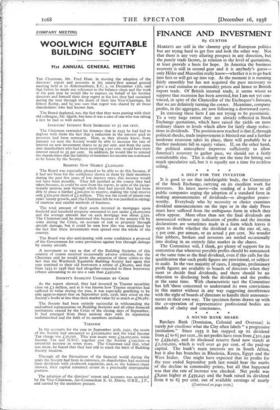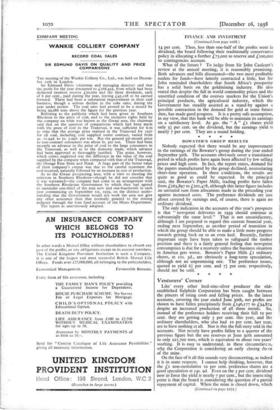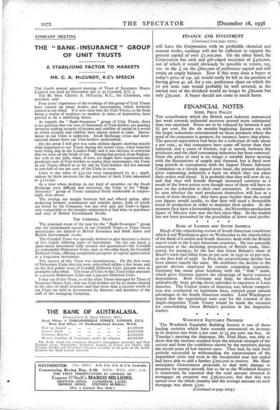FINANCE AND INVESTMENT By CUSTOS MARKETS are still in the
clammy grip of European politics but are trying hard to get free and look the other way. Not that there is any very alluring prospect in any direction, but the purely trade factors, in relation to the level of quotations, at least provide a basis for hope. In America the business recovery is still in second gear and it is anybody's guess— only Hitler and Mussolini really know—whether it is to go back into first or will get up into top. At the moment it is running fairly smoothly but has not acquired the pace necessary to give a real stimulus to commodity prices and hence to British export trade. Of British internal trade, it seems wisest to suppose that recession has been arrested, but I am not yet con- vinced, in spite of the Chancellor of the Exchequer's forecas4 that we are definitely turning the corner. Meantime, company . profits, in the aggregate, are now following a downward curve.
In stressing these facts I am not trying to be pessimistic. To a very large extent they are already reflected in Stock Exchange quotations, which have raised the yields on most ordinary shares to levels which allow for fairly sharp reduc- tions in dividends. The position now reached is that if, through political shocks, trade improvement is blotted out and a further moderate recession takes its place, there will probably be a further moderate fall in equity values. If, on the other hand, the political atmosphere improves sufficiently to allow America's recovery to gather pace, we should see a fairly considerable rise. This is clearly not the time for letting out much speculative sail, but it is equally not a time for reckless selling.
* * * * A HELP FOR THE INVESTOR
It is good to see that indefatigable body, the Committee of the Stock Exchange, carrying on its excellent work for investors. Its latest move—the sending of a letter to all public companies urging the adoption of a standard form in making announcements of dividends—is altogether praise- worthy. Everybody who by necessity or choice examines dividend announcements on the tape or in the daily Press must have suffered from the ambiguous form in which they often appear. More often than not the final dividends are announced without any indication of profits and the interim declarations are sometimes made in a form which leaves it open to doubt whether the dividend is at the rate of, say, 5 per cent. per annum, or an actual 5 per cent. No wonder that jobbers, brokers and investors are misled occasionally into dealing in an entirely false market in the shares.
The Committee will, I think, get plenty of support for its contention that wherever possible profits should be announced at the same time as the final dividend, even if this calls for the qualification that such profit figures are provisional, or subject to audit. In the vast majority of cases, I imagine, preliminary profit figures are available to boards of directors when they meet to decide final dividends, and there should be no objection to disclosing both the dividends and the profits at the same time. With characteristic tact the Committee has left 'those concerned to understand its own convictions in this matter without in any way suggesting interference with the right of boards of directors to handle their announce- ments in their own way. The specimen forms drawn up with the co-operation of representative professional bodies are models of 'clarity and conciseness. * . * * *
A SOUND BANK SHARE
Barclays Bank (Dominion, Colonial and Overseas) i& surely par excellence what the City often labels " a progressive institution." Since 1933 it has stepped up its dividend from 4 to 6i per cent.' its net profits have risen from £321,549 to £439,245, and its disclosed reserve - fund now stands at £2,100,000, which is well over 40 per cent. of the paid-up capital. The bank's main interests are in South Africa,. but it also has branches in Rhodesia, Kenya, Egypt and the West Indies. One might have expected that its profits for the year ended September 3oth last would_ bear the marks of the decline in coinniodity prices, but all that happened was that the rate of increase was checked. Net profit was £8,000 higher at £439,245 and the bank raised its dividend from 6 to 61 per cent. out of available earnings of nearly - 4Continued on page Lop.) FINANCE AND INVESTMENT
(Continued from page 1068.)
14 per cent. Thus, less than one-half of the profits went in dividend, the board following their traditionally conservative policy in allocating a further £75,000 to reserve and £roo,000 to contingencies account.
What of the future ? To judge from Sir John Caulcutt's review at the annual meeting, it is reasonably promising. Both advances and bills discounted—the two most profitable outlets for funds—have latterly contracted a little, but Sir John reminded shareholders that South Africa's prosperity has a solid basis on the goldmining industry. He also stated that despite the fall in world commodity prices and the unsettled condition of the oversea markets for the Union's principal products, the agricultural industry, which the Government has steadily assisted as a stand-by against a possible contraction in the demand for gold at some future date, has made good progress. It is a pretty safe assumption, in my view, that this bank will be able to maintain its earnings on a satisfactory level. At 40s. the " A " £r shares yield only 31 per cent. on the dividend, but the earnings yield is nearly 7 per cent. They are a sound holding.
* * * *
BOWATER'S GROUP RESULTS
Nobody expected that there would be any improvement in the earnings of the Bowater's group during the year ended September 3oth. The accounts obviously cover a transitional period in which profits have again been affected by low selling prices and high costs. In fact, the report states, demand for the papers manufactured by the group declined, necessitating short-time operation. In these conditions, the results are quite as good as could be expected. In the principal unit, the Bowater's Paper Mills, trading profits have fallen from £263,897 to £202,478, although this latter figure includes an unstated sum from allocations made in the preceding year against increased costs. The preference dividends are just about covered by earnings and, of course, there is again no ordinary dividend.
The only indication in the accounts of this year's prospects is that "newsprint deliveries in 1939 should continue at substantially the same level." That is not unsatisfactory, although I am prepared to regard this current financial year, ending next September, as another period of transition in which the group should be able to make a little more progress towards getting back on to an even keel. Recently, further important steps have been taken to safeguard the timber position and there is a fairly general feeling that newsprint consumption is due for a recovery unless the business situation in America gets worse. Bowater's Paper Mills £r ordinary shares, at us. 3d., are obviously a long-term speculation, although not an unpromising one. The preference issues, quoted to yield 61 per cent. and 71 per cent. respectively, should not be sold.
Venturers' Corner Like' every other lead-zinc-silver producer the old- established Sulphide Corporation has been caught between the pincers of rising costs and falling prices. In the latest accounts, covering the year ended June 3oth, net profits are shown to have fallen precipitately from £146,177 to £34,874 despite an increased production of all three metals. So, instead of the preference holders receiving their full to per cent, they are getting only 5 per cent. this year, and the ordinary shareholders, who also had ro per cent. last year, are to have nothing at all. Nor is this the full story told in the accounts. Not merely have profits fallen to a quarter of the previous figure but the ore reserves at June 30th amounted to only 221,700 tons, which is equivalent to about two years' working. It is easy to understand, in these circumstances, why the Corporation is considering an early closing down of the mine.
On the face of it all this sounds very disconcerting, as indeed it is in some respects. I cannot help thinking, however, that the £r non-cumulative ro per cent. preference shares are a good speculation at 14s. 9d. Even on the 5 per cent. dividend now in force the yield is nearly 7 per cent., but the interesting point is that the board is considering the question of a partial repayment of capital. When the mine is closed down, which (Continued on page 1072.) FINANCE AND INVESTMENT (Continued from page 1070.) will leave the Corporation with its profitable chemical and cement works, earnings will not be sufficient to support the present capital of over £i,000,000. On the other hand, the Corporation has cash and gilt-edged securities of £47o,000, out of which it would obviously be possible to return, say, los. in the £ on the £600,00o of preference capital and still retain an ample balance. Now if this were done a buyer at today's price of 14s. 9d. would really be left in the position of having- given 4s. 9d. for a los. preference share on which the to per cent. rate would, probably be well covered, as the annual cost of the dividend would no longer be £6o,000 but only £30,000. A buyer should not come to much harm.
















































 Previous page
Previous page